#personalizedtherapies
Text
Global Monoclonal Antibodies Market Size Expected to Reach $158.3 Bn by 2030 | iDataAcumen
The report "Global Monoclonal Antibodies Market - Global Forecast to 2030", is approximated to be USD 158.3 Billion in 2023, and it is projected to reach USD 359.2 Billion by 2030, at a CAGR of 11.6%.
In the dynamic landscape of healthcare, the rise of monoclonal antibodies (mAbs) has sparked a revolution, offering new avenues of treatment for a myriad of diseases. From cancer to autoimmune disorders, these remarkable biopharmaceuticals are transforming the way we approach medical care, driving growth and innovation in the Monoclonal Antibodies Market.
One of the key dynamics shaping the Monoclonal Antibodies Market is the increasing prevalence of chronic and complex diseases. As the global burden of conditions like cancer, rheumatoid arthritis, and multiple sclerosis continues to rise, there is a growing demand for targeted and effective treatment options. Monoclonal antibodies, with their ability to specifically target diseased cells while sparing healthy tissue, are uniquely positioned to meet this need, driving market growth in the process.
Moreover, advancements in biotechnology and genetic engineering have fueled the development of novel monoclonal antibodies with enhanced efficacy and reduced side effects. From antibody-drug conjugates to bispecific antibodies, these next-generation therapies are expanding the scope of possibilities in the Monoclonal Antibodies Market, opening doors to new indications and treatment modalities.
Furthermore, the increasing adoption of personalized medicine is driving the demand for monoclonal antibodies tailored to individual patient profiles. With the advent of precision medicine and molecular diagnostics, healthcare providers can now identify patients who are most likely to benefit from mAb therapy, optimizing treatment outcomes and reducing healthcare costs in the process.
Ask for Sample Copy: https://www.idataacumen.com/request-sample/global-monoclonal-antibodies-market
In conclusion, the Monoclonal Antibodies Market stands at the forefront of healthcare innovation, propelled by a convergence of factors including the rising prevalence of chronic diseases, advancements in biotechnology, and the shift towards personalized medicine. As we continue to harness the power of monoclonal antibodies to tackle some of the most pressing health challenges of our time, the future holds boundless potential for growth, discovery, and improved patient outcomes.

#monoclonalantibodies#healthcareinnovation#medicaladvancements#medicalbreakthroughs#betterpatientoutcomes#chronicdiseases#targetedtherapies#marketdemand#biotechnology#geneticengineering#nextgenerationtherapies#precisionmedicine#personalizedtherapies#optimizedtreatment
0 notes
Link
#ACThealthcarebreakthrough#ANUinnovation#BrainCancerBiobank#Braincancertreatment#Braintumorinsights#CanberraHospitalpatients#Canberraresearchers#Healthresearchgrant#Innovativemedicaladvancements#Personalizedtherapies
0 notes
Text
Biologics: Revolutionizing Medicine With Advanced Therapies
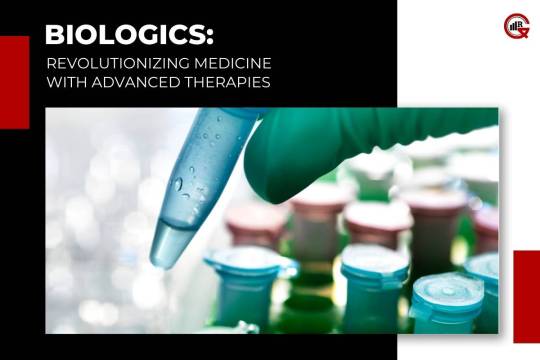
In the realm of modern medicine, biologics have emerged as a groundbreaking class of therapeutic agents, offering new hope and innovative treatment options for a wide range of diseases. From cancer and autoimmune disorders to infectious diseases and genetic disorders, biologics harness the power of biological molecules to target specific pathways in the body, providing tailored therapies with enhanced efficacy and reduced side effects. In this article, we delve into the world of biologics, exploring their origins, mechanisms of action, therapeutic applications, and the transformative impact they have on healthcare.
Understanding Biologics: Origins and Characteristics
Biologics are a class of medicinal products derived from living organisms, including cells, tissues, proteins, and nucleic acids. Unlike traditional small molecule drugs synthesized through chemical processes, biologics are produced using advanced biotechnological methods, such as recombinant DNA technology and cell culture techniques. These complex molecules exhibit a high degree of specificity and potency, targeting specific molecular pathways involved in disease processes.
One of the defining features of biologics is their large molecular size and structural complexity, which enables them to interact with specific receptors or molecules in the body with exquisite precision. This targeted approach allows biologics to modulate immune responses, inhibit tumor growth, replace deficient proteins, or correct genetic abnormalities, making them highly effective therapeutic agents for a diverse array of medical conditions.
Mechanisms of Action and Therapeutic Applications

Biologics exert their therapeutic effects through various mechanisms of action, depending on their specific molecular targets and intended clinical indications. Some common mechanisms of action include:
Targeted Inhibition: Biologics can selectively inhibit specific molecules or pathways involved in disease pathogenesis. For example, monoclonal antibodies bind to cell surface receptors or soluble proteins, blocking their activity and preventing disease progression. This targeted approach is particularly effective in cancer therapy, where monoclonal antibodies can target tumor-specific antigens or growth factors, leading to tumor regression and improved patient outcomes.
Immune Modulation: Biologics can modulate immune responses by targeting key mediators of inflammation or autoimmunity. Biologic agents such as tumor necrosis factor (TNF) inhibitors and interleukin (IL) antagonists suppress pro-inflammatory cytokines, thereby alleviating symptoms of autoimmune diseases such as rheumatoid arthritis, psoriasis, and inflammatory bowel disease.
Cellular Therapy: Some biologics involve the use of living cells or tissues to replace or regenerate damaged tissues or organs. Cellular therapies such as chimeric antigen receptor (CAR) T-cell therapy harness the power of engineered immune cells to target and destroy cancer cells, offering a promising new approach to cancer treatment.
Gene Therapy: Gene therapy utilizes biological agents, such as viral vectors or nucleic acid-based molecules, to introduce therapeutic genes into target cells, correcting genetic abnormalities or promoting desired therapeutic effects. This revolutionary approach holds the potential for treating genetic disorders, inherited diseases, and certain types of cancer by addressing the underlying genetic causes of disease.
The therapeutic applications of biologics span a wide range of medical specialties, including oncology, immunology, hematology, neurology, and infectious diseases. Biologics have revolutionized the treatment landscape for conditions such as cancer, autoimmune diseases, rare genetic disorders, and infectious diseases, offering new avenues for personalized medicine and precision therapeutics.
Challenges and Future Directions

While biologics hold tremendous promise for improving patient outcomes and transforming healthcare, they also present unique challenges and considerations. These include:
Cost and Accessibility: Biologics are often complex and expensive to manufacture, leading to high treatment costs that may limit access for some patients. Efforts to improve affordability and expand access to biological therapies are essential to ensure equitable healthcare delivery.
Immunogenicity and Safety: Biologics can elicit immune responses in some patients, leading to the development of anti-drug antibodies that may reduce efficacy or cause adverse reactions. Strategies to mitigate immunogenicity and enhance the safety profile of biologics are ongoing areas of research and development.
Regulatory Considerations: The regulatory approval process for biologics involves stringent requirements for safety, efficacy, and quality control. Regulatory agencies play a critical role in ensuring the safety and effectiveness of biological therapies through rigorous preclinical and clinical testing.
Looking ahead, the future of biologics holds tremendous promise, with ongoing advancements in biotechnology, genomics, and personalized medicine driving innovation in therapeutic development and delivery. Emerging technologies such as CRISPR gene editing, mRNA vaccines, and cell-based therapies are expanding the possibilities for biological interventions, offering new hope for patients with unmet medical needs.
Emerging Trends and Innovations
In addition to existing biological therapies, several emerging trends and innovations are shaping the future of biological medicine:
Biosimilars: Biosimilars are biologic products that are highly similar to an already approved reference biologic, with no clinically meaningful differences in safety, efficacy, or quality. Biosimilars offer a more affordable alternative to expensive biologic therapies, promoting competition in the market and expanding access to treatment options for patients.
Next-Generation Biologics: Advances in biotechnology are driving the development of next-generation biologics with enhanced properties and functionalities. These include engineered antibodies with improved binding affinity or specificity, novel protein scaffolds for drug delivery, and bi-specific or multi-specific antibodies capable of targeting multiple disease pathways simultaneously.
Personalized Medicine: The era of personalized medicine is revolutionizing biologic therapy, with advances in genomics, biomarker discovery, and patient stratification enabling tailored treatment approaches. By identifying genetic variations, biomarkers, and disease subtypes, personalized medicine allows for more precise matching of patients with the most effective biological therapies, maximizing therapeutic outcomes and minimizing adverse effects.
Drug Delivery Technologies: Innovations in drug delivery technologies are enhancing the efficacy, safety, and convenience of biological therapies. These include novel formulations such as sustained-release formulations, nanoparticle-based delivery systems, and targeted drug delivery approaches that enable site-specific delivery of biologics to diseased tissues while minimizing systemic exposure and off-target effects.
Combination Therapies: Combination therapies involving multiple biological agents or a combination of biological and small molecule drugs are emerging as a promising strategy for tackling complex diseases and overcoming treatment resistance. By targeting multiple disease pathways or mechanisms of action simultaneously, combination therapies offer synergistic effects and improved therapeutic outcomes compared to monotherapy approaches.
Ethical and Social Implications
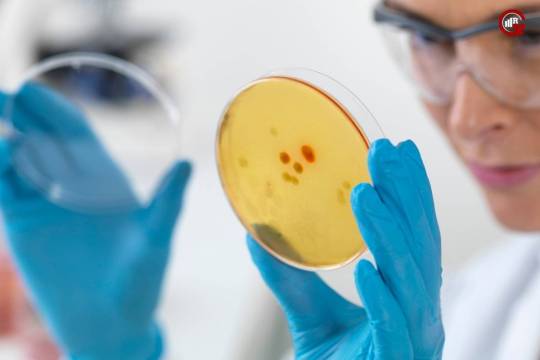
The widespread adoption of biological therapies raises important ethical and social considerations that must be addressed:
Equitable Access: Ensuring equitable access to biological therapies is essential to address disparities in healthcare delivery and promote health equity. Efforts to reduce treatment costs, improve insurance coverage, and expand access to underserved populations are critical to ensure that all patients can benefit from biologic innovations.
Informed Consent and Patient Autonomy: Patients receiving biologic therapies must be adequately informed about the risks, benefits, and alternatives to treatment to make informed decisions about their healthcare. Respecting patient autonomy and preferences is paramount in the era of personalized medicine, where treatment choices may be more individualized and complex.
Data Privacy and Security: The use of biological therapies often involves the collection, storage, and analysis of sensitive patient data, including genetic information and medical records. Protecting patient privacy and maintaining data security is imperative to safeguard patient confidentiality and prevent unauthorized access or misuse of personal health information.
Healthcare Resource Allocation: Biologic therapies, particularly novel and expensive treatments, may pose challenges for healthcare systems in terms of resource allocation and prioritization. Balancing the costs and benefits of biological therapies against competing healthcare needs requires careful consideration of economic, ethical, and societal factors to ensure optimal allocation of limited resources. In conclusion, biologics represent a paradigm shift in medicine, offering targeted, effective, and personalized therapies for a wide range of diseases.
From monoclonal antibodies and cytokine inhibitors to cellular and gene therapies, biologics are reshaping the treatment landscape and improving patient outcomes worldwide. As we continue to unlock the potential of biologic therapies, it is essential to address challenges related to access, safety, and affordability to ensure that all patients can benefit from these transformative innovations in healthcare.
0 notes
Text
Unlocking Wellness Through Personalized Physical Therapy Programs
Discover a new level of care with Motion for Health's personalized physical therapy programs. Our dedicated team crafts individualized plans that prioritize your unique needs and goals. Whether recovering from an injury, managing chronic conditions, or enhancing overall wellness, our programs are designed for you. Experience the power of personalized care at Motion for Health, where each session is a step towards a healthier, more mobile you.
#PersonalizedTherapy#PhysicalWellness#CustomizedRecovery#TailoredCare#TherapeuticJourney#RehabilitationGoals#IndividualizedHealing#HolisticRecovery
0 notes
Text
Customizing TMS Treatments with EEG Brain Mapping
A Revolutionary Approach in El Paso
The psychiatric practice of Alfredo H. Arellano is offering the most advanced treatments in the mental health field. In El Paso, a groundbreaking approach to treating conditions like depression, OCD, and anxiety is taking shape. The method? Combining the power of Transcranial Magnetic Stimulation (TMS) with insights from EEG brain mapping. But what does this…
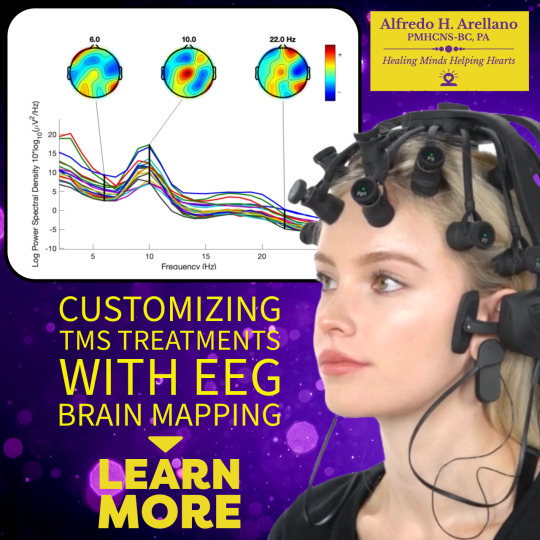
View On WordPress
#AnxietyTreatment#BrainFingerprint#BrainHealthElPaso#BrainWaveInsights#CuttingEdgeTreatment#DepressionSolutions#DrArellano#DrBerlowTMSExpert#EEGBrainMapping#El Paso Mental Health#El Paso Texas#El Paso TMS#ElPasoPsychiatry#MagneticStimulation#MentalHealthElPaso#MentalHealthInnovation#NeurologicalAdvancements#OCDRelief#PersonalizedTherapy#TailoredTreatments#TMSandEEGSynergy#TMSRevolution
0 notes
Text
Navigating the Antibiotics Renaissance: Trends in the Market 2024-2033
The Antibiotics Market is undergoing a renaissance as new strategies and technologies redefine the landscape from 2024 to 2033. Despite longstanding challenges such as antimicrobial resistance and a dwindling pipeline of novel antibiotics, innovative approaches are revitalizing the market.
Advancements in genomic sequencing, machine learning, and synthetic biology are enabling the discovery of novel antimicrobial agents and the optimization of existing antibiotics. Additionally, the emphasis on precision medicine and personalized treatment regimens is driving the development of targeted therapies that minimize collateral damage to the microbiome, thus mitigating resistance.
#AntibioticsMarket #AntimicrobialResistance #PrecisionMedicine #DrugDiscovery #InfectiousDiseases #Microbiome #GenomicSequencing #SyntheticBiology #PersonalizedTherapies #DrugOptimization #MachineLearning #Biotechnology #InnovationInHealthcare #FutureofMedicine #HealthcareTrends
0 notes
Photo
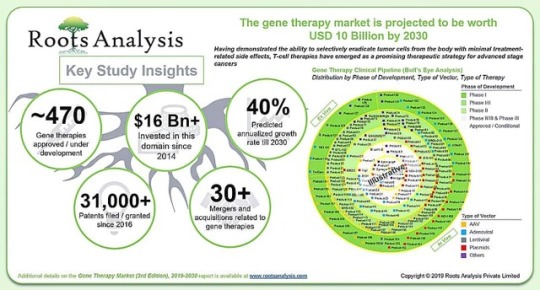
@RootsAnalysis has announced the addition of “Gene Therapy Market (3rd Edition), 2019-2030” report to its list of offerings. #genetherapy #precisionmedicine #geneediting #genome #genomics #crispr #dna #vectors #viralvector #plasmiddna #personalizedtherapy #market #opportunity #science #research #report #marketsize https://www.instagram.com/p/B3JQv3CpmaN/?igshid=u7ck42pn73ui
#genetherapy#precisionmedicine#geneediting#genome#genomics#crispr#dna#vectors#viralvector#plasmiddna#personalizedtherapy#market#opportunity#science#research#report#marketsize
0 notes
Photo
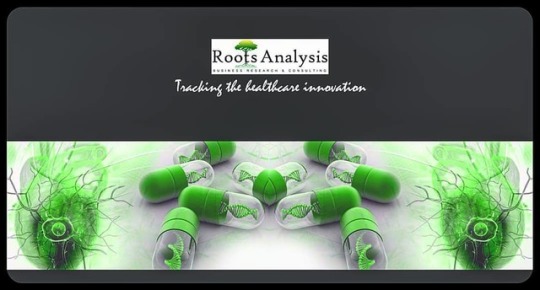
In 2019, three gene therapies, namely Zolgensma® (@Novartis), Zynteglo™ (@bluebirdbio) and Beperminogene perplasmid (AnGes MG) were approved. Over time, the gene therapy pipeline has evolved significantly. #genetherapy #precisionmedicine #geneediting #genome #genomics #crispr #dna #vectors #viralvector #plasmiddna #personalizedtherapy #market #opportunity #science #research #report #marketsize https://www.instagram.com/p/B3JPKU5J4vv/?igshid=70rj8arfu5w8
#genetherapy#precisionmedicine#geneediting#genome#genomics#crispr#dna#vectors#viralvector#plasmiddna#personalizedtherapy#market#opportunity#science#research#report#marketsize
0 notes